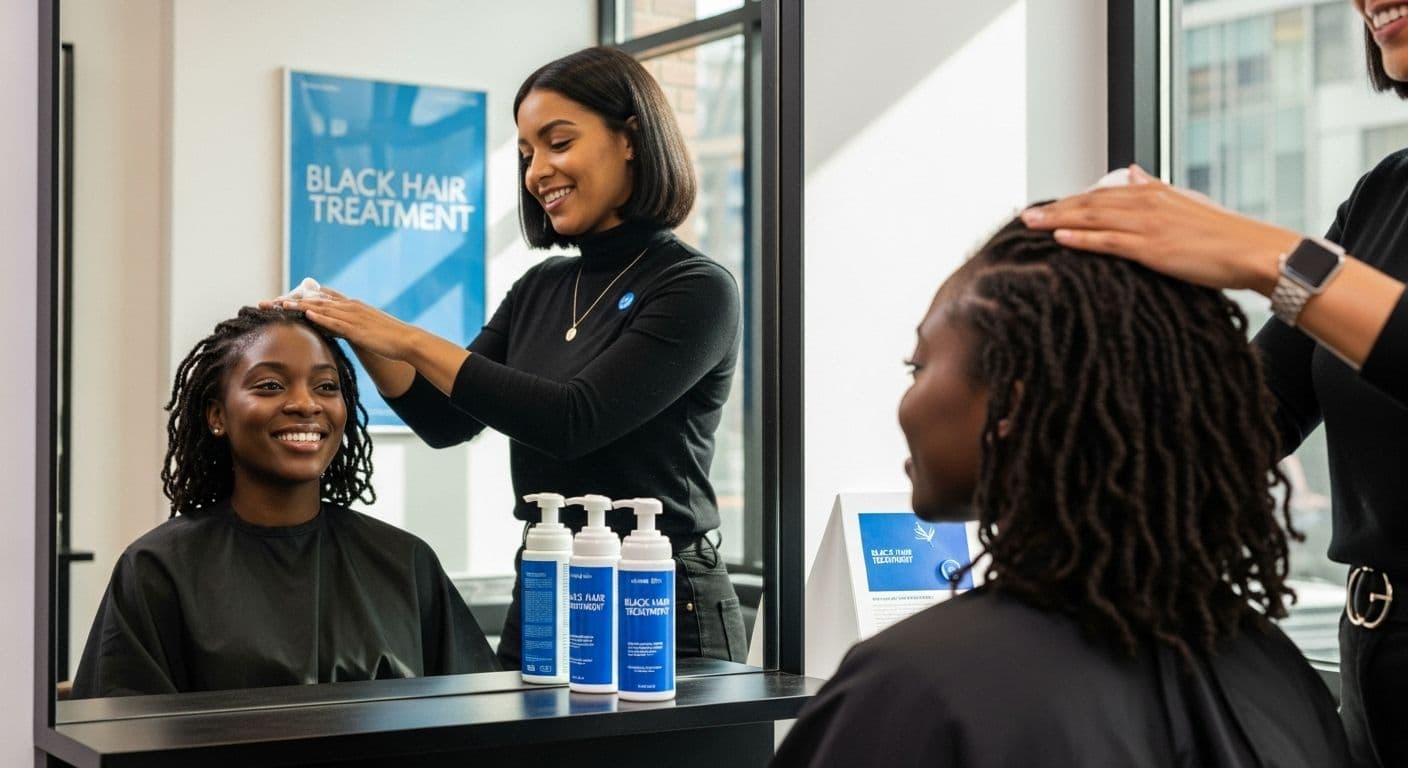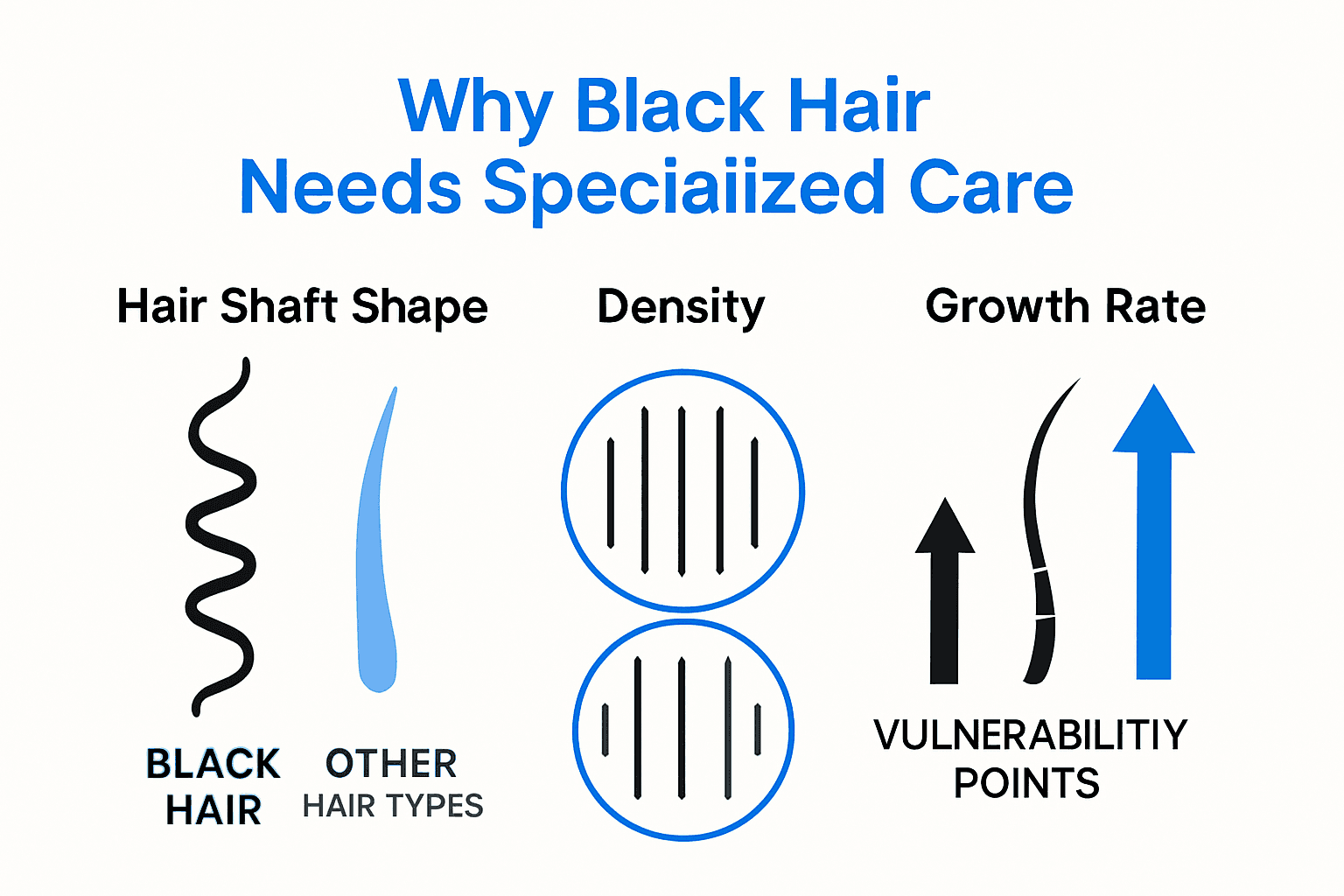Blog
Learning Materials
Best Black Hair Treatment for Growth and Hair Loss
Updated: August 13, 2025

Black hair brings a world of beauty and character but caring for it comes with unique challenges that other hair types never face. Get this. Studies show black hair grows more slowly and has up to 30 percent less density than other hair types. Most people think the answer lies in basic conditioners or expensive oils. The real breakthrough happens when you use science-backed treatments designed specifically for black hair’s structure. That’s where real growth and strength begin.
Table of Contents
- Understanding Black Hair Structure And Challenges
- Top Black Hair Treatment Options For Hair Loss
- How To Track Hair Growth Progress Effectively
- Choosing Personalized Solutions And Trusted Brands
Quick Summary
| Takeaway | Explanation |
|---|---|
| Understand Black Hair Characteristics | Black hair has unique anatomy, including slower growth rates and lower density, requiring targeted care strategies. |
| Use Specialized Treatments | Effective treatments for black hair loss, like minoxidil, require formulations tailored to its unique structure and needs. |
| Incorporate Nutritional Support | A balanced diet with proteins, vitamins, and minerals is essential for promoting hair growth and overall health. |
| Track Hair Growth Progress | Utilize scientific and digital methods to monitor growth effectively and adjust care strategies accordingly. |
| Consult Professionals for Guidance | Engage with experts to develop personalized treatment plans that address specific hair types and challenges. |
Understanding Black Hair Structure and Challenges
Black hair represents a unique and complex hair type with distinctive structural characteristics that significantly impact hair growth, health, and maintenance. Understanding these intrinsic properties is crucial for developing effective black hair treatment strategies that address specific challenges.
The Unique Anatomy of Black Hair
Afro-textured hair possesses a remarkable and complex structure that sets it apart from other hair types. Research from the Journal of Cosmetic Dermatology reveals that African American hair demonstrates unique biological characteristics including slower growth rates, lower hair density, and smaller hair diameter compared to other ethnic hair types.
The structural differences stem from the hair's cross-sectional shape and curl pattern. Unlike straight hair, black hair features an oval-shaped hair shaft with a tight helical curl pattern. This distinctive geometry creates natural tension points and potential weak spots along the hair strand. As a result, the hair becomes more susceptible to mechanical stress, breakage, and moisture loss.
To highlight the unique features of black hair structure and clarify the challenges it faces, here is a summary table outlining the key anatomical and mechanical differences discussed in the article.
| Feature | Black Hair | Other Hair Types |
|---|---|---|
| Growth Rate | Slower | Faster |
| Hair Density | Up to 30% less | Higher |
| Hair Shaft Shape | Oval with helical curl | Round/oval, less curled |
| Curl Pattern | Tight, helical | Looser or straight |
| Oil Distribution | More difficult, leads to dryness | Easier distribution |
| Strand Thickness | Smaller diameter, more fragile | Thicker, more robust |
| Breakage Susceptibility | Higher due to structure/vulnerability | Lower |
Mechanical Vulnerabilities and Structural Challenges
According to a comprehensive study in Cosmetics, Afro-textured hair experiences heightened fragility due to its unique morphological characteristics. The helical curl pattern creates multiple points of structural vulnerability where the hair is more likely to bend, twist, and potentially break.
These structural challenges mean that black hair requires specialized care approaches. Traditional hair treatments often fail to address the specific needs of this hair type. The tight curl pattern makes it more challenging for natural scalp oils to travel down the hair shaft, leading to increased dryness and potential breakage. Moreover, the reduced hair diameter means that each strand carries less structural integrity, making careful handling and moisture management critical.
Holistic Approach to Black Hair Care
Addressing black hair's unique structural challenges requires a multifaceted approach. This involves understanding the hair's inherent characteristics and developing targeted treatment strategies that respect its natural structure. Moisture retention, gentle handling, and protective styling become paramount in maintaining hair health.
Nutrition, scalp health, and targeted black hair treatments play crucial roles in mitigating structural vulnerabilities. By recognizing the distinctive anatomy of black hair, individuals can develop personalized care routines that promote strength, growth, and overall hair wellness. Learn more about personalized hair growth strategies.
Understanding these structural nuances transforms hair care from a generic routine to a specialized, informed approach that celebrates and supports the unique beauty of black hair.

Top Black Hair Treatment Options for Hair Loss
Addressing hair loss requires a comprehensive and targeted approach, especially for individuals with black hair. The complexity of Afro-textured hair demands specialized treatment strategies that recognize its unique structural characteristics and potential vulnerabilities.
Topical Treatments and Medications
Research from the National Institutes of Health highlights minoxidil as a primary treatment for androgenetic alopecia. For black hair, the 5% solution proves more effective than the 2% concentration. This topical treatment works by stimulating blood flow to hair follicles, potentially encouraging growth and reducing hair loss.
Interestingly, researchers at the University of Virginia have made significant discoveries about hair growth mechanisms. They identified a critical stem cell population in hair follicles that plays a crucial role in hair regeneration. When these cells become depleted, hair growth stops, suggesting that future treatments might focus on replenishing or activating these specific stem cells.
Holistic Nutritional and Lifestyle Interventions
Beyond topical treatments, addressing hair loss requires a multifaceted approach. Nutrition plays a pivotal role in hair health. Dietary interventions can significantly impact hair growth and prevent further loss. Research from Johns Hopkins University suggests that diet composition can directly influence hair health, with certain dietary patterns potentially contributing to hair loss or restoration.
Key nutritional strategies include increasing protein intake, ensuring adequate vitamin D and iron levels, and consuming foods rich in biotin and omega-3 fatty acids. These nutrients support hair follicle health and can potentially mitigate hair loss progression. Explore our comprehensive guide on natural hair growth solutions.
Advanced Treatment Technologies
Emergent technologies offer promising solutions for black hair loss treatment. Platelet-rich plasma (PRP) therapy and low-level laser therapy represent cutting-edge approaches that show potential for stimulating hair growth. These treatments work by promoting cellular regeneration and improving blood circulation to hair follicles.
Below is a comparison table summarizing the different approaches recommended for black hair loss, so readers can quickly see each method's focus and essentials.
| Treatment Approach | Main Focus | Example Methods/Tools |
|---|---|---|
| Topical Treatments & Medications | Stimulate blood flow, support follicle health | Minoxidil (higher concentration for black hair) |
| Nutritional & Lifestyle Interventions | Promote overall hair and scalp health | Protein, vitamin D, iron, biotin, omega-3 |
| Advanced Treatment Technologies | Stimulate growth at the cellular level | PRP therapy, low-level laser therapy |
| Professional Guidance | Personalized diagnosis & plan | Scalp analysis, customized recommendations |
Additionally, personalized treatment plans that combine medical interventions, nutritional support, and specialized hair care routines offer the most comprehensive approach to managing hair loss. Understanding individual hair loss patterns, genetic predispositions, and specific hair structure becomes crucial in developing effective treatment strategies.
It is essential to consult with healthcare professionals and trichology experts who specialize in black hair care. They can provide tailored recommendations that address the unique challenges of Afro-textured hair, ensuring a holistic and effective approach to hair loss treatment.
How to Track Hair Growth Progress Effectively
Tracking hair growth progress for black hair requires a nuanced and specialized approach that considers the unique structural characteristics of Afro-textured hair. Understanding the intricacies of hair growth measurement becomes crucial for developing effective monitoring strategies.
Scientific Measurement Techniques
Research published in clinical studies demonstrates significant variability in hair growth parameters among African individuals. Hair density can range from 90 to 290 hairs per square centimeter, with growth rates fluctuating between 150 to 363 micrometers per day. This variability underscores the importance of precise and personalized tracking methods.
Key measurement techniques include:
- Photography with consistent lighting and positioning
- Digital microscopy for detailed follicle analysis
- Length measurements using standardized techniques
- Scalp and hair density mapping
Digital Tracking and Technology
Comparative research on ethnic hair characteristics highlights the need for specialized tracking methods. Modern technological solutions now offer advanced ways to monitor hair growth progress. Explore our AI-powered hair tracking solutions that provide detailed, personalized insights.
Digital tracking tools can help individuals:
- Monitor hair growth rates
- Analyze hair density changes
- Identify potential scalp health issues
- Generate comprehensive growth reports
Holistic Progress Monitoring
Genomic research on textured hair emphasizes the importance of comprehensive monitoring beyond simple length measurements. Effective hair growth tracking should incorporate multiple factors:
- Scalp health assessment
- Nutritional impact evaluation
- Stress and lifestyle considerations
- Treatment effectiveness analysis
Successful hair growth tracking requires patience and consistent documentation. Individuals should establish a baseline measurement and track progress over time, understanding that hair growth is a complex process influenced by numerous internal and external factors.

Consult with hair care professionals who specialize in black hair to develop a personalized tracking strategy. Their expertise can help interpret results, provide targeted recommendations, and support your hair growth journey with scientific precision and cultural understanding.
Choosing Personalized Solutions and Trusted Brands
Selecting the right hair treatment solution for black hair requires a comprehensive and nuanced approach that goes beyond generic recommendations. The complexity of Afro-textured hair demands personalized strategies that consider individual hair characteristics, genetic predispositions, and specific growth challenges.
Evidence-Based Treatment Selection
Research published in the International Journal of Women's Dermatology emphasizes the critical importance of individualized treatment choices for hair loss in Black patients. The study highlights that effective solutions must be tailored to specific hair loss types, such as traction alopecia, central centrifugal cicatricial alopecia (CCCA), or androgenetic alopecia.
Key considerations in treatment selection include:
- Precise diagnosis of hair loss type
- Understanding individual scalp health
- Assessing genetic and lifestyle factors
- Evaluating potential treatment interactions
Professional Guidance and Personalized Approaches
A comprehensive review in the Journal of Clinical and Aesthetic Dermatology underscores the significance of professional medical supervision in managing black hair treatments. Dermatologists specializing in ethnic hair can provide targeted recommendations that address unique structural and physiological challenges.
Personalized treatment plans typically involve:
- Comprehensive scalp and hair analysis
- Customized product recommendations
- Ongoing monitoring and adjustment
- Holistic approach considering nutrition and lifestyle
Discover our personalized hair care assessment that provides tailored insights into your specific hair health needs.
Trusted Brands and Innovative Solutions
Choosing trusted brands requires careful evaluation of product ingredients, clinical research, and specific formulations designed for black hair. Look for solutions that:
- Contain scientifically proven ingredients
- Are developed with input from trichology experts
- Demonstrate understanding of Afro-textured hair characteristics
- Provide transparent research and testing information
Effective brand selection goes beyond marketing claims. It requires a critical approach that prioritizes:
- Ingredient quality and safety
- Scientific validation
- Cultural understanding of hair care needs
- Commitment to addressing specific challenges of black hair
Consult with hair care professionals who specialize in black hair treatments. Their expertise can guide you toward solutions that not only address hair loss but also promote overall hair health and growth. Remember that the most effective treatment is one that respects the unique characteristics of your hair and addresses your individual needs.
Frequently Asked Questions
What treatments are effective for black hair growth?
To promote growth in black hair, specialized treatments like minoxidil are effective. The 5% solution is particularly recommended for its ability to stimulate blood flow to hair follicles.
How can I prevent hair loss in black hair?
Preventing hair loss involves a holistic approach, including nutritional support with adequate protein, vitamins, and minerals, alongside gentle handling and protective styling to reduce mechanical stress.
What nutritional factors support black hair health?
Key nutritional factors for black hair health include consuming foods rich in protein, biotin, omega-3 fatty acids, and maintaining adequate levels of vitamins D and iron to support follicle health and growth.
How can I effectively track hair growth progress?
Effective tracking of hair growth can be achieved through photographic documentation, measurements using standardized techniques, and utilizing digital tracking tools to monitor changes in hair density and overall scalp health.
Take Control of Your Black Hair Growth Journey—Powered by AI
If you are tired of slow hair growth, breakage, and the frustration of treatments that do not fit the unique structure of black hair, there is a smarter solution. The main article highlighted how crucial it is to identify mechanical vulnerabilities, track progress accurately, and choose evidence-based products that truly support black hair. Ordinary routines often miss hidden patterns or fail to deliver lasting results. You deserve a science-driven approach that truly understands your hair—right down to every strand.

Experience personalized hair care with MyHair.ai. Upload a scan to get a deeply individualized analysis, track your hair growth, and access expert-backed product suggestions made for your unique needs. Built with advanced AI, our platform turns your hair challenges into a clear action plan with measurable progress. Ready for stronger, healthier black hair? Visit MyHair.ai, try a scan today, and see the difference true personalization makes. If you want advice on tailored treatments, view our personalized hair care assessment and start transforming your hair journey now.